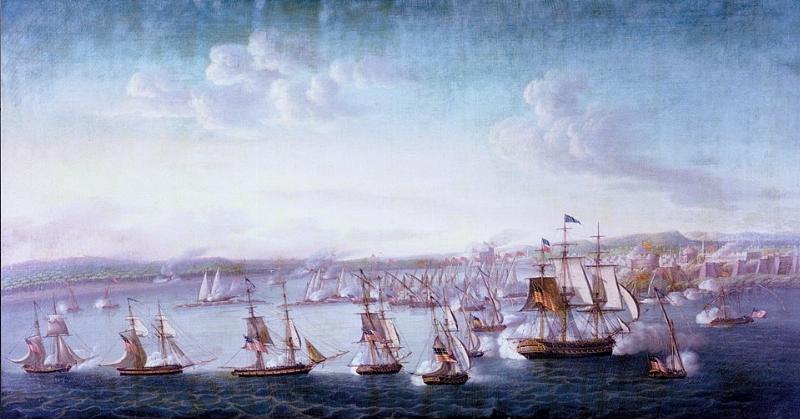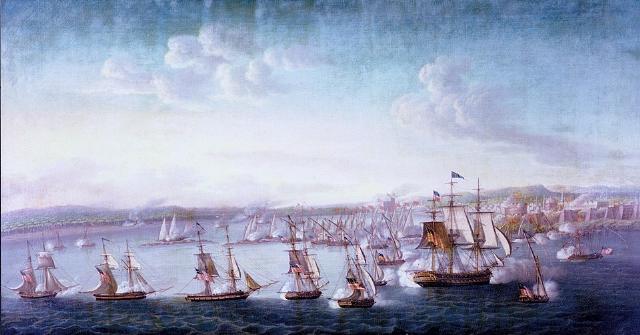



From Wikimedia Commons: Bombardment of Tripoli, August 3, 1804 (Michele Felice Cornè, 1806)
In the decades following the American Revolution, the U.S. found itself navigating a perilous global seascape. Deprived of British naval protection, its merchant ships became vulnerable to predation from the notorious “Barbary corsairs” — state-sponsored pirates operating from the North African coast. These sailors, under the command of Muslim tyrants in Algiers, Tunis, Tripoli, and Morocco, preyed on Christian shipping in the Mediterranean and Atlantic, capturing ships and enslaving their crews.
For the U.S., a nation newly born and diplomatically inexperienced, the threat posed by the Barbary States demanded an unprecedented response. What followed was a clash of ideologies, religions, and maritime powers that would define early American foreign policy, naval expansion, and its role on the international stage.
The Barbary corsairs behaved partly like “rogue pirates” of the Seven Seas. In reality, however, they were state-sanctioned agents of piracy and enslavement. Overseen by the respective governments of the Barbary States, the sailors justified their actions in religious and economic terms. Under common interpretations of Islamic law, it was both permissible and admirable to wage “jihad” against Christian states, with slavery and plunder being considered perfectly acceptable. Thus blessed as holy warriors, Muslim corsairs reveled in the large-scale capture of Christian sailors and civilians for centuries. In response, European powers — anticipating the modern-day appeasement of actively hostile Muslim-majority states — paid tribute to prevent attacks on their shipping.
Between the 16th and 19th centuries, an estimated one to 1.25 million Europeans were captured and sold into slavery in North Africa. These captives were forced into hard labor or held for ransom in appalling conditions. The reach of Barbary piracy was shockingly extensive. In 1627, corsairs raided the coasts of Iceland in what became known as the “Turkish Abductions”, capturing hundreds of men, women, and children. Similarly, coastal towns in Ireland, Cornwall, and even the Faroe Islands were not immune to sudden and brutal raids.
The “white slave trade” operated by the Barbary States was a geopolitical scourge that long preceded American independence. However, it would soon ensnare the new republic in its grasp.
Following independence in 1776, American merchant ships were no longer protected under the umbrella of the British Royal Navy. Without any military muscle or maritime alliances, they became easy targets for the Barbary corsairs. In 1785, two American ships, the Maria and the Dauphin, were captured by Algerian pirates, and their crews were enslaved. This incident jolted the young republic into realizing the vulnerabilities of its unarmed merchant fleet.
Lacking a standing navy and deeply in debt after the Revolutionary War, the U.S. initially followed the path of diplomacy and tribute — an approach well-worn by European powers. Over the next decade, the U.S. paid hundreds of thousands of dollars to the Barbary States in the form of gold, weapons, and naval stores, hoping to buy peace and ensure safe passage. Yet this strategy proved unsustainable and morally untenable to legislators and officials.
Among the most vocal opponents of tribute was Thomas Jefferson, who, as Minister to France in the 1780s, had firsthand experience dealing with North African diplomacy. In 1786, Jefferson and John Adams met with Sidi Haji Abdrahaman, the ambassador of Tripoli, in London. When they asked him why Muslim states attacked American ships unprovoked, the ambassador famously replied that it was “written in their holy book” to wage war on all non-believers and that enslaving captives was sanctioned by divine law.
Jefferson was appalled by the religious justification for piracy and enslavement. Sharing an ancient wisdom, he concluded that tribute — or any other form of appeasement — only encouraged further aggression. Upon becoming president in 1801, he refused to continue the escalating payments demanded by the pasha of Tripoli. In response, Tripoli declared war on the U.S. — a bold move that triggered the First Barbary War, the first overseas military conflict in American history.
Without waiting for Congress to formally declare war, Jefferson dispatched the fledgling U.S. Navy to the Mediterranean. The war marked a pivotal moment in American naval history. Not only did it signal the beginning of U.S. power projection beyond its shores; it also highlighted the strategic and logistical challenges of fighting a war thousands of miles from home.
Notable among the events of the war was the capture of the USS Philadelphia which ran aground in Tripoli Harbor in 1803. The ship and its crew were detained by the Tripolitans. In a daring raid, Lieutenant Stephen Decatur led a small group of Marines who infiltrated the harbor, burned the Philadelphia to prevent enemy use, and escaped — a feat that earned international acclaim and praise from British Admiral Horatio Nelson as “the most bold and daring act of the age.”
The war culminated in a land assault in 1805 (i.e., the Battle of Derna), involving U.S. Marines and local mercenaries, famously referenced in the Marine Corps Hymn: “To the shores of Tripoli.” This campaign forced the pasha to negotiate peace, release American captives, and end the demand for tribute — at least temporarily.
Though the First Barbary War was successful in principle, it did not eliminate the threat entirely. After the War of 1812, in which the U.S. again found itself under naval duress, the Barbary corsairs deviously resumed attacks on American ships. In response, President James Madison dispatched a powerful squadron under Commodore Stephen Decatur in 1815.
Decatur’s swift and decisive naval campaign forced Algiers, Tunis, and Tripoli to capitulate, renounce future tribute demands, and release all American prisoners. The Second Barbary War effectively ended the era of American tribute payments and reasserted the nation’s maritime sovereignty. It was also symbolic of the new American posture — confident, militarized, and unwilling to be coerced by old-world powers.
The significance of the Barbary Wars went beyond regional skirmishes; they were a crucible in which early American ideals and strategy were tested. On the one hand, they evinced the practical need for a standing navy and the defense of commercial interests. On the other hand, they reflected outrage at the enslavement of white Christians by savage infidels, though slavery continued to flourish on American soil.
Jefferson’s rhetoric against the “vile practice” of white slavery was captivating. Yet he himself ran a plantation, Monticello, in Virginia, allegedly keeping up to 400 black slaves during his lifetime. A student of mathematics, philosophy, and law at the College of William & Mary, he impressed his teachers with his insights and reflections. Later, as a politician, he was farsighted and decisive. The contradiction between his thoughts on liberty and his practices as a slaveholder epitomizes the paradox that plagued the early republic: a divided opinion about human dignity, depending on race. Nevertheless, the Barbary conflict did help galvanize a growing abolitionist sentiment among some Americans and challenged the notion that the U.S. should rely solely on diplomacy in foreign affairs.
The Barbary Wars left an indelible mark on the U.S. They contributed to the establishment of a permanent navy, influenced the development of early American foreign policy, and offered a template for future engagements abroad. These conflicts also exposed the brutal realities of slavery beyond the transatlantic African trade and broadened the American understanding of global human bondage.
Perhaps most importantly, the wars signaled that the U.S., though young and militarily modest, would not be bullied by foreign powers. Jefferson’s refusal to pay tribute was a turning point in U.S. diplomatic history — a moment when moral conviction and national pride converged to shape a new identity.
The struggle between the U.S. and the Barbary States in the late 18th and early 19th centuries was a defining moment for the nascent republic. It forced the U.S. to grapple with the complexities of diplomacy, war, slavery, and international law. From the harrowing accounts of American sailors enslaved in North Africa to the bold naval campaigns launched in response, this episode showcased the tensions between idealism and pragmatism that have long characterized American foreign policy.
In standing up to the corsairs of the Barbary Coast, the U.S. took its first steps toward becoming a global maritime power — one that, for better or worse, would shape the course of international relations for centuries to come.
